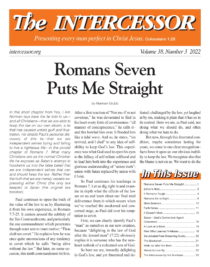
Men Who Learned It: Moses
Moses had come some way. He was a disciple, he was consecrated, and the thin red line of his consecration held him to God, when all else was in ruins; and so we read, he “was content to dwell” in Midian. As Joseph in captivity, as Jacob when told to return to meet Esau, so Moses submitted, prayed, watched, waited. Indeed God cannot open to us these subtle deeper levels of our independent selves, that division between soul and spirit to which the writer to the Hebrews says only the Word of God can pierce (4:12), until we are already given over into His hands, come weal or woe. None else can stand those purifying fires which alone can prepare the spirit for its destined union. And so the day came when “the angel of the Lord appeared unto Moses in a flame of fire out of the midst of a bush.”
Forty years before “he supposed his brethren would have understood that God by His hand would deliver them.” Now he says to God, “Who am I that I should…bring forth the children of Israel out of Egypt?”
The lesson had been learned. Self cannot do it, not even commissioned and consecrated self. But the day of the greater lesson than mere self-emptiness had come. It was a bush that burned with fire and yet was not consumed. An earthly bush alight with a heavenly fire. A common bush aflame with God, the bush the fuel for the flame, yet constantly renewed. The union in a picture! And Moses had eyes to see “that great sight” and to hear the voice of the One who put its meaning into words. Moses was that busy. The only trouble was the he had thought himself uncommon! Now he was common enough just to be the fuel for the heavenly flame. God had come down to save His people, but it was to be God in Moses–Moses the bush and God the fire. And to complete the revelation He gave Himself another name–I AM–”I AM is sending you.” Strange name, colorless, indefinite, we would say. No, rather, all-inclusive, all in all. I AM everywhere, always, all things, within, without, before, behind, present, future. Union indeed. God in Moses, Moses in God. From that time onwards he lived and acted under the directions of Another. Moses was a living, feeling human being; many times we see him temporarily fearing, complaining, angry, pitying himself, even disobedient; like Paul, he had “fightings without and fears within”; but from these temporary descents into the flesh, he knew the way back to where he now lived his real life, that hidden life “with Christ in God,” where the I AM lived in him. Down he would go on this face, as the people murmured, threatened, and even rebelled. As outward voices were stilled, the inner Voice would speak to him: “I will rain bread from heaven”: “Thou shalt smite the rock, and there shall come water out of it”: and with the word of faith in his mouth and the rod of faith in his hand, all Israel could see God coming through a man in mighty word and deed. Moses himself in one phrase told them the secret he had learned, when he told the revels, Korah, Dathan and ABiram, the judgment that was coming to them, and added, “Hereby ye shall know that the Lord hath sent me to do all these works; for I have not done them of my own mind.” There is no clearer instance than Moses in the Old Testament biographies of the way God teaches man the limitations, delusion and sin of the independent self, the helplessness of the human spirit; and then the glories of His way of grace by which He Himself, God the Spirit, makes His abode in us, in indissoluble union.
The final test on Moses’ spirit, the human spirit, the ego, which can still love itself more than God, was at the Mount. Abraham was tested at Mount Moriah, Moses at Mount Sinai. IN one moment he had a chance of greatness. He could be the founder of a nation. Israel had corrupted itself at the very foot of the mountain where he was communing with God. “Let me alone that I may consume them,” said the Lord, “and I will make of thee a great nation.” Not one reference do we find by Moses to that offer. He totally ignored it. That was the measure of his God-possession. Instead of that, consumed with the desire for the salvation of the people, after dealing most drastically with their sin, he set himself to “make atonement” for them, father than mortal man had ever gone before. None but the indwelling Intercessor could have led him that distance, when he offered, like the Savior Himself, not only his body, but his immortal soul for their redemption. “Oh, this people have sinned a great sin,” he cried. ‘Yet now if Thou wilt forgive their sin–.” Silence, Perhaps a great inner conflict and then the final word, “and if not, blot me, I pray Thee out of Thy book which Thou hast written.”





